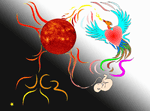« Our true nationality is humanity. »
Herbert George Wells. |
«You can only understand people
if you feel them in yourself.» John Steinbeck. |
The return to sensitive communication
according to ancient civilisations.
4 - The miracle of empathic communication :
After this episode recounting the escape from Egypt of a people who had been held there as slaves, centuries passed, punctuated by the rise and fall of civilisations, and marked, in each individual, by a permanent struggle between respect and hatred for the other.After many centuries, this struggle led to the emergence of a new school of thought, heralded by the teachings of Jesus. This new vision of human relations was to transform the law frozen in words into real-life experiences and feelings
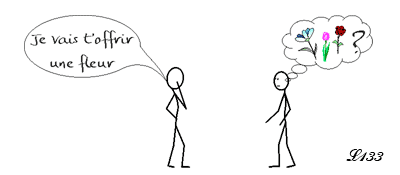
Intentions...

...are not the same as actions.
At the time, political change was impossible without violence, so it was through religion and the example set by one man that change began.
We have already discussed the circumstances of this man's birth [NdA], as well as the environmental and family conditions that contributed to his development.
We also discussed the long transition in religious culture from a vengeful god to a god of love [see : The Importance of Laws].

Words and feelings.
Thanks to feelings, any prohibition has been transformed into a lived experience :
- Compassion - ‘Let he who is without sin cast the first stone’, (John 8:7 the adulteress)
- Moral sense - ‘Let the little children come to me, for theirs is the kingdom of heaven’, (Luke 18:16, Matthew 19:14)
- Non-judgement - ‘Do not judge and you will not be judged’ (Luke 6:37)
- Love without limits.
All summed up in one sentence :
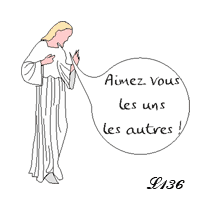
It is thanks to this transformation of human relationships that an event will take place that will be described as miraculous by all those who had forgotten that they were capable of perceiving the world in a different way.
How will this event be described by Jesus' disciples ?
Bible Gateway - Acts 2 : 1-13
Acts 2 : 1
When the day of Pentecost, they were all together in one place.
When the day of Pentecost, they were all together in one place.
The group plays an important role here, because everyone needs the experience of others in order to be transformed.
120 disciples, including the 12 apostles (according to tradition), brought together by the teaching of their ‘messiah’, learned and put into practice new behaviour.
This behaviour is described in " 1 Peter 4: 8-10 ".
This gift, the result of the long transformations brought about by Evolution, is the one that everyone is endowed with from birth [cf : the child's moral sense].8 - Above all, love each other deeply, because love covers over a multitude of sins.
9 - Offer hospitality to one another without grumbling.
10 - Each of you should use whatever gift you have received to serve others, as faithful stewards of God’s grace in its various forms.
It is shown in the example given by the life of Jesus:
- the sharing of the loaves (John 6, 1-16),
- compassion for the adulteress (John 8:7),
- forgiveness: ‘Absolve, and you will be absolved’ (Luke 6:37),
- acceptance (the gift of his life).
Although we cannot say that the event recounted in the ‘Acts of the Apostles’ is true, due to a lack of historical evidence, we can nevertheless imagine that an incomprehensible event was transformed into an extraordinary event as it spread, before being recounted by other disciples.
To do this, we could imagine that men who had relearned to feel and rediscover within themselves the capacities of their childhood, ceased to conform to written rules and henceforth acted according to their hearts.
Acts 2 : 2
Suddenly a sound like the blowing of a violent wind came from heaven and filled the whole house where they were sitting.
Suddenly a sound like the blowing of a violent wind came from heaven and filled the whole house where they were sitting.
For us, the description of such an event is a metaphor for the opening up of a hitherto attenuated or even erased sense : hearing.
We know that one of the very first senses to appear in the foetus is that of hearing [cf : The sensory universe of the foetus]. This sense listens, not to speech, but to sounds coming from the mother's environment: the gurgling of the intestine, the beating of the heart, the emotions expressed by the mother's voice and the movements of her body...
Hearing will be perfected, as it is essential for the development of the sense of empathy that the child will express from the 18th month onwards.

Of course, in the context of the text we are looking at, it is not a question of hearing with the sense of hearing, but of feeling, in the depths of our being, the information that reaches us through this sense.
Acts 2 : 3
They saw what seemed to be tongues of fire that separated and came to rest on each of them.
They saw what seemed to be tongues of fire that separated and came to rest on each of them.
Using a new metaphor, this passage indicates that all the participants became aware of something to which each of them had individual access.
How did this awareness come about ?
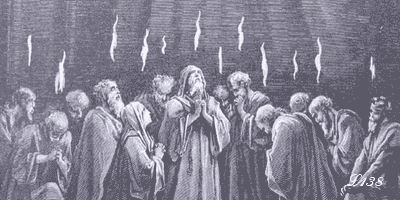
To feel at a distance, hearing is not enough : it can detect emotions but cannot determine the cause of these emotions. For that, vision is needed.
Vision, which complements hearing, is also essential to the development of empathy and compassion. How can we experience these feelings if we are unable to hear a voice altered by emotion, or to read the same emotion on a face ?

Vision is enough...

...where speech shows its limitations.
Acts 2 : 4
All of them were filled with the Holy Spirit and began to speak in other tongues[a] as the Spirit enabled them.
All of them were filled with the Holy Spirit and began to speak in other tongues[a] as the Spirit enabled them.
So the appearance of tongues of fire could mean the rebirth of a lost sense that suddenly allows us to discover a reality different from that described by words.
The rediscovered sensitivity, a source of spontaneity and openness towards others, will give rise to a new mind, not one of reason and law, but one of listening, observation and the feelings experienced: a mind that can be considered to have become ‘healthy’ once again.

What we perceive of the world often depends on learning.

In children, this perception depends on their senses.
After the domination of a world seen through words, reality becomes luminous. Believing and seeing with the heart are incomparable.
Acts 2 : 5
Now there were staying in Jerusalem God-fearing Jews from every nation under heaven.
Now there were staying in Jerusalem God-fearing Jews from every nation under heaven.
Although they came from all parts of the world, these men had one thing in common, and that was their piety : they were believers who followed the laws of Moses and listened to their fellow men. Their lives are no longer governed by the mere meaning of words : their feelings determine their conduct.
Acts 2 : 6
When they heard this sound, a crowd came together in bewilderment, because each one heard their own language being spoken.
When they heard this sound, a crowd came together in bewilderment, because each one heard their own language being spoken.
This multitude then perceived things differently.
Let's go back to the first moments of human development.
For the listening foetus, the sounds that reach it could be no more than noises. Yet they are linked to the mother's feelings : well-being, irritation, tiredness, pleasure... By establishing its first contact with the surrounding universe, the unborn child learns its first language, the one selected by the "evolution-god".
So how are we to understand this noise heard by the multitude ? We can understand it as the shudder that runs through every body during an intense emotion, and this emotion experienced by each person spreads to everyone present. No one can remain silent.
In this passage we see two communities with different experiences:
- those whose spirit has been transformed, who speak and act through the language of the heart,
- those who act only according to the law, for whom the event is a mystery that arouses their curiosity.
 |
 |
Laughter, a shared emotion.
Acts 2 : 7
Utterly amazed, they asked : "Aren’t all these who are speaking Galileans ?
Utterly amazed, they asked : "Aren’t all these who are speaking Galileans ?
How can we fail to be surprised and fascinated by such an event? When we are used to understanding only the people who share our culture, when we are used to understanding life only through the words that try to describe it, it's a miracle to discover that people all speak the same language through their gestures and emotions.
However, the astonishment only concerns those who reason. For those who feel, the question no longer arises.
So we see a reversal of the situation: whereas the development of speech paralleled the inhibition of sensitivity, the renaissance of sensitivity puts all cultural knowledge in the background. Whereas words encourage misunderstanding, feeling enables everyone to understand and share.
Acts 2 : 8
Then how is it that each of us hears them in our native language ?
Then how is it that each of us hears them in our native language ?
Aren't we confusing mother tongue and social language here?
The social language is the language that we learn, long after birth, and which corresponds to the codes established within the group.
The mother tongue is the language that develops within the mother. It will be put into practice after birth, at the heart of the family: it is the language of the parents' love for their child.
So what is the “mother tongue” that this multitude perceives? It is the language of communication and sharing, a forgotten sharing that has just been rediscovered.
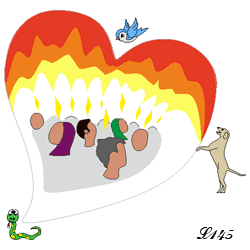
Pentecost : recovery of sensitivity and self-awareness,
in communion with every living thing and being in this world.
in communion with every living thing and being in this world.
Acts 2 : 9
Parthians, Medes and Elamites; residents of Mesopotamia, Judea and Cappadocia, Pontus and Asia,
Parthians, Medes and Elamites; residents of Mesopotamia, Judea and Cappadocia, Pontus and Asia,
Acts 2 : 10
Phrygia and Pamphylia, Egypt and the parts of Libya near Cyrene; visitors from Rome, (both Jews and converts to Judaism);
Phrygia and Pamphylia, Egypt and the parts of Libya near Cyrene; visitors from Rome, (both Jews and converts to Judaism);
Acts 2 : 11
Cretans and Arabs—we hear them declaring the wonders of God in our own tongues !” ?
Cretans and Arabs—we hear them declaring the wonders of God in our own tongues !” ?
Jesus, by speaking of a god of love and encouraging people to follow his example, gave his fellow human beings back the ability to communicate through their feelings, and the ability to understand the feelings of others, not through knowledge, but through the rebirth of empathy.
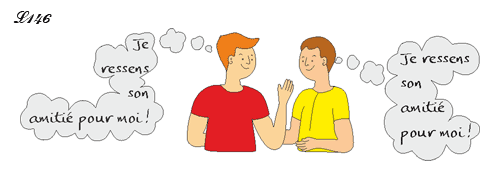
Acts 2 : 12
Amazed and perplexed, they asked one another, “What does this mean ?”
Amazed and perplexed, they asked one another, “What does this mean ?”
Reasonable man, by learning to inhibit his instinctive perception, has rendered it unconscious. He has ended up forgetting that such possibilities lie within him. When he becomes capable of feeling again, he can only wonder.
Should he listen to his feelings, let himself be moved by the beauty or misery in the world around him ?
Should he give credence to the language that teaches that a poor person is despicable, and put forward false abilities that are linked to money and power ?
If they have not taken the conscious step of freeing themselves from their inhibitions, ‘reasonable’ people can find themselves unsure of what to do.

A mystery can give rise to crazy interpretations.
Actes 2 : 13
Some, however, made fun of them and said, “They have had too much wine.”
Some, however, made fun of them and said, “They have had too much wine.”
In the same way, the reasonable man, who has acquired the habits of the community and possesses personal convictions, generally judges the expression of sensitivity to be profoundly ridiculous.
As we have seen, a similar judgment is made of the dreams we have at night, when they tell a story too far removed from generally accepted behaviour.
So, without being able to live his sensibility, man will judge the world around him solely on the basis of his knowledge and experience, in other words, his ignorance. For example, if he knows that wine weakens self-control, he'll attribute the unusual behaviors he witnesses to its intake.

There are 3 possible behaviours when faced with an unusual situation:
- astonishment on the part of the person who has not taken any action but is discovering abilities he did not know he had,
- ignorance on the part of the person who does not know how to react,
- contempt on the part of the person who remains within the realm of his knowledge alone.
- astonishment on the part of the person who has not taken any action but is discovering abilities he did not know he had,
- ignorance on the part of the person who does not know how to react,
- contempt on the part of the person who remains within the realm of his knowledge alone.
« The Word became flesh » John 1 : 14
« The Word became true again. »
« The only universal language known today is emotional and gestural language,
relayed by hearing and vision,
apart from any speech. » [NdA]
relayed by hearing and vision,
apart from any speech. » [NdA]

«
Do you have the universal language ?
Look at this picture !
What are the characters saying to each other ?
Do you feel compassion ?
Ask yourself !
« Am I ready to protect them and all other species ? »
Look at this picture !
What are the characters saying to each other ?
Do you feel compassion ?
Ask yourself !
« Am I ready to protect them and all other species ? »
« The sensitive man loves Life,
The reasonable man calculates his life. »
The reasonable man calculates his life. »
The origin of verbal language : (continued)
Bibliography :

